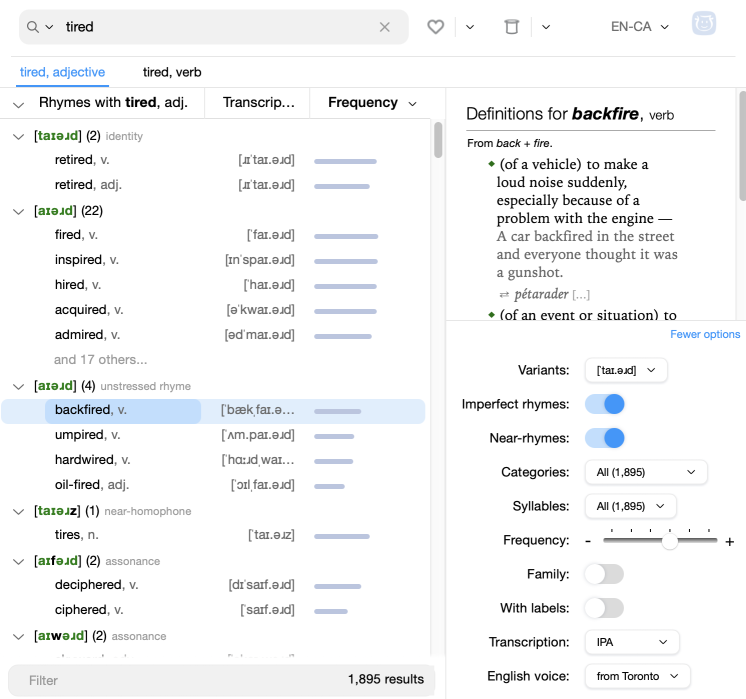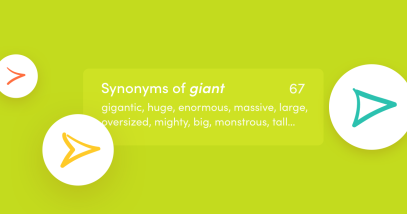Find the Right Word, With Rhymes

You are probably familiar with Antidote’s dictionaries, but are you taking full advantage of them? In this fourth article of our “Find the right word” series, we introduce you to the dictionary of rhymes. This dictionary is one of the important new features of Antidote 11, which Antidote Web and Antidote Mobile inherit. Make no mistake: it’s not just for poetry!
SERIES — Find the right word
Perfect Rhymes, Imperfect Rhymes and Near-Rhymes
A rhyme is a repetition of the same sound at the end of two lines or two rhythmic units. Each distinct sound used to form words is called a phoneme. The more phonemes in common, the stronger the rhyme.
For example, the rhyme between domino and casino has three common phonemes ([ino]), while that between domino and topminnow has five ([o_mino]).
This dictionary first identifies a word’s perfect rhymes. For two words to be perfect rhymes, their vowels with primary stress must be identical in sound, as should all sounds that follow the vowels with primary stress. Additionally, the onset (the consonant sound preceding the primary-stressed vowel) must be different. For example, the words revive [ri-VIVE] and deprive [di-PRIVE] are perfect rhymes.
Far from being a conventional resource, Antidote’s dictionary of rhymes also suggests a word’s imperfect rhymes. Here are the categories and some examples.
- Identity: Identities differ from perfect rhymes by the fact that the onset (the consonant or consonant cluster preceding the stressed vowel) is identical in both words. For example, revive [ri-VIVE] and survive [suhr-VIVE] are identities since the onset [v] is identical in both words.
- Unstressed rhymes: Unstressed rhymes differ from perfect rhymes by a difference in primary stress between the identical final sounds in both words. For example, revive [ri-VIVE] and archive [ARK-ive] are unstressed rhymes since the primary stress falls on the second syllable of revive and the first syllable of archive.
The dictionary even suggests words that share other phonetic similarities, which are called near-rhymes. Here are the categories and some examples.
- Near homophones: These are words that only differ from the headword by a single phoneme, regardless of its position in the word. Refuge from refuse.
- Similar consonants: These words have endings that differ only by similar consonant sounds. A race for praise.
- Similar vowels: These words have endings that differ only by similar vowel sounds. A crawly trolley.
- Assonance: Assonance occurs when two words have matching vowel sounds in the primary stress, regardless of consonants. The philosophy of theology.
- Consonance: Consonance occurs when two words have matching consonant sounds after the vowel with primary stress, regardless of vowels. A brick sack.
These few examples already give us a peek into the full potential of the dictionary, both for classical verses and for slam. Here is an administration of inspiration for witty ditties and strong songs!
The Dictionary’s Interface and Its Fruitful Functions
The Antidote dictionary of rhymes presents a word’s rhymes by phonetic endings, placing the rhyme with the most phonemes in common first. The results are accompanied by a bar indicating the frequency index of the word.
-
 123546
123546
The central column shows the phonetic transcription and, if you have an Antidote+ subscription, its audio pronunciation. Click to hear the headword followed by the chosen rhyme. You will immediately see if this is the sound you are looking for!
But beware, accent influences rhyme! Make sure to choose the voice in the options panel accordingly, between Toronto and London.

It is precisely thanks to this panel that you will get the best out of the dictionary of rhymes: use it to include imperfect rhymes or not, include near-rhymes or not, display only one category such as nouns or adjectives, and specify the number of syllables or frequency index.
Quick tip: keep the Family option off to exclude words of the same family from the results. This will avoid overly easy rhymes, such as discreet and indiscreet.
Examples of Uses for the Dictionary of Rhymes
It is not just the poet or the lyricist who can benefit from rhymes. Here are more common examples, just to add some colour to your quill.
For Titles or Slogans
With the right use of rhymes and similar sounds, and the right number of syllables, a title becomes more appealing. Whether it’s an advertising slogan, the front page of a newspaper, or the title of a report.
Why use the headline Large brands worry when a title like What big brands dread will catch the readership’s attention?
Let’s imagine that you are in charge of communications at Druide and you have to find a new slogan for Antidote. The new dictionary tells you there are 23 perfect rhymes for “corrector.” You’re not writing poetry, so you have a bit more freedom with the rhymes. You add imperfect rhymes to the search. Now you’re up to 834 rhymes. That’s a lot of inspiration! You then focus on the nouns, reducing the results to 631.
“The Antidote corrector, a most reliable inspector” has a perfect rhyme and it could work. But what if you’re looking for something a bit more subtle that doesn’t only focus on the corrector?
Ha! You found a slogan for our marketing team: More than a corrector, for writing full of character!

To Bring Out a Smile
Feel free to use the same tips and tricks to wrap up an email, spice up a social media post, or sign a birthday card.
“A happy new year…
There are more ways to complete this wish than there are people you want to address it to:
…to you and all those you hold dear”
…and best wishes most sincere”
…and the next bus always near” (for the public transport user in your life!)
As this is the last article in our “Find the Right Word” series, let us express our own wishes for these holidays filled with elegance and decadence: may Antidote help you write with eloquence.
To learn more about rhymes, see the Antidote language guide article on rhyme (the link only works if you have access to Antidote Web; otherwise, you can find the article simply by typing “rhyme” in the guide search box).
And to learn about the rhyming dictionary in great detail, see the User Guide (Available to all on this website).
Get the latest edition of Antidote!
Visit the web store


